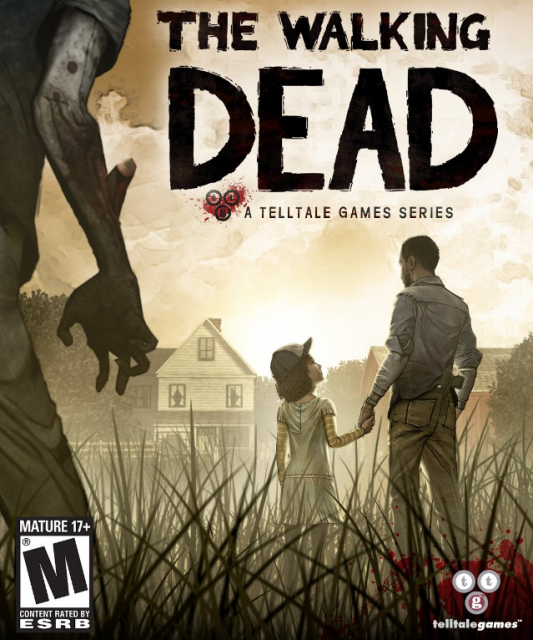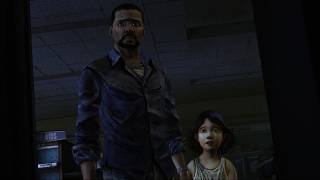
Larry's had a heart attack.
His daughter Lilly is leaning over him, hands on his chest, administering CPR to her father in a manner so frantic that none of the other survivors sealed in this meat locker can be sure if she's desperate from determination or simply in denial. Kenny stands to one side, loudly voicing his fears that if Larry can't be roused, it won't be long before they're locked in the room with a newly-turned Walker. Lilly shouts back, panicked screams between compressions that seem as ineffective at convincing herself as they are everybody else. In the heat of the moment, everybody's eyes fall on you. Even Clementine, removed from the situation as she sits in the corner, seems to be looking at you as if she expects you to resolve the matter before a full-scale fight breaks out.You take a deep breath, and go with your gut instinct: "Stand back Lilly, I'll see if I can help him."
You kneel beside the unmoving body, place one hand on top of the other, and begin giving compressions in the hope of restarting Larry's ailing heart. One... two... three... four... five...
All the while you discern flickers of movement in the corner of your eye, but you're so focused on helping this old man that you ignore it. It's not until the heavy block of salt-lick comes down on Larry, obliterating his head and showering you and Lilly with the contents of his skull, that you realise what's happened.
You wanted to save the guy. Kenny wanted to end him. In the end, Kenny's will won out.

After spending ten hours so far with Telltale's The Walking Dead, the above moment is probably the one that's stuck with me the most. Part of that is no doubt because it's a shocking moment, a key narrative point that has a dramatic effect on character relationships for the remainder of the episode and beyond. It reveals a darker, more ruthless side to Kenny's character, and amplifies the ongoing rivalry between him and Lilly for control of the camp. But I think the main reason I still can't shake Larry's demise from my mind three days after witnessing it is because it completely subverted my expectations, and not just from a story perspective, but as a gamer too - I picked the good choice, but it didn't prevent me from getting the bad ending.
This isn't a situation we're presented with very often as players of video games. The Walking Dead's forebears, games that gave birth to the notions of player choice and moral decisions, have ingrained within us a certain expectation when it comes to how that stuff works in a video game. You make a choice, one way or the other, and depending on which side of the fence you come down on, you're rewarded with a different outcome. Choose the noble option and good things will happen. This truism doesn't apply to The Walking Dead, though. As demonstrated by the choice I made above, even taking the moral high ground doesn't guarantee a pleasant sugar-and-rainbows outcome.

A lot of video games are power fantasies - means of escapism that allow the player to command strength and influence they don't have in the real world. In morality-driven games like the Mass Effect franchise, the player's choices play into that power fantasy archetype, and this is reflected in both the nature of the choices presented to the protagonist and their impact on the world around them. You, as Commander Shepard, are the most important human in the galaxy, so every single decision you make should reflect that by being both important and impacting on a potentially galactic level. Most crucially of all, though, your decisions should be the ones that matter, far more than those of the auxiliary NPCs you spend the majority of the game interacting with. For the most part in these games, whatever the player says goes. Even if other central characters disagree with you, they will usually grudgingly come around to your way of thinking long enough for you to get what you want. Why? Because the game is escapist wish fulfilment, and if Shepard gets what he wants, then by extension so does the player.
By contrast, The Walking Dead acknowledges the oft-overlooked harsh reality of personal choice in desperate situations - that not everybody is going to go along with your decision. You don't dictate to the NPCs, you merely opine. Sometimes you'll sway them a little, but most of the time you won't. Take the above situation as an example - no matter whether you choose to off him or help him, Larry dies. Should you choose to help him, Kenny doesn't tut under his breath and sulk in the corner while you play hero - he takes matters into his own hands and makes a decision of his own, a decision that overrides the one of the player and lets them know that this ain't no power fantasy. This is a world where other voices hold just as much weight as your own, if not more.

As a consequence, the choices made by the player in The Walking Dead become less about what actually happens as a direct result, and more about what kind of man you want the other survivors to perceive Lee to be. Nowhere is this more true than in the case of Lee's relationship with Clementine, easily the game's strongest story thread. Shortly after Larry's death, Lee confronts one of the St John brothers while armed with a pitchfork. Still reeling from what the guy had done to us, I chose to drive that fork straight through him. As I did, a high-pitched scream rang through the barn, and I knew I'd made a grave mistake. The knowledge that Clementine watched me kill a man has weighed heavily on me ever since, and from that moment forward I've done my utmost to avoid unnecessary violence while in her presence. Yep, I care more about what an opinionated AI masquerading as an eight-year-old girl thinks of me than I do about having an impact on who lives or dies. Feel free to call me crazy.
Judging by responses to Alex's review of the game here on Giant Bomb, and some of the comments on the game's trailers, there's a significant portion of the game's player base who didn't like the way Telltale dealt with the impact of the player's choices in The Walking Dead. Some clearly felt that the game didn't cater enough to the typical gamer's omnipotence-fuelled notions of moral decisions. Personally, I feel that the decision to avoid that approach elevates the quality of the writing on The Walking Dead to a level that all other video games of its type should aspire to. Telltale could have made Lee the bad-ass infallible leader of the survivors' camp, with his decisions entirely governing the way every event in the game plays out, but if they had, it would have made the whole game a much weaker piece of interactive storytelling. As things stand, Lee's position as the every-man caught in the middle, a man whose words don't dictate the actions of others, makes both him and the entire supporting cast feel more like real people, and therefore more relatable. It makes situations like Larry's heart attack feel more fraught and unpredictable. And when the pay-off of the situation doesn't go the way Lee hopes it will, it hits home with more impact than any authoritarian command ever could.
That's all I've got to say on the matter. As I said above, I've been carrying these feelings around for a few days now and just wanted to get them down in some form and put them out there, maybe even find out what other people think. At the time of writing this blog I'm still only four episodes through The Walking Dead, but If all goes to plan I should make it through the fifth and final instalment at some point tomorrow. In the meantime, I want to thank you for taking the time to read this blog. I'll see you around, I'm sure.
Dan
---
Currently playing - The Walking Dead (PC)
Log in to comment